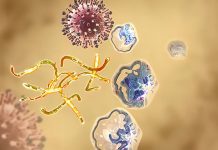
A new study from the Fujita Health University reveals high levels of anthranilic acid in blood are at increased risk of developing Major Depressive Disorder
Major Depressive Disorder affects over 300 million people around the world, however, so far there have been no established biomarkers that clinicians can rely on to detect early-stage depression symptoms.
A new study published in Scientific Reports, reveals that scientists at Fujita Health University led by Professor Yasuko Yamamoto and Professor Kuniaki Saito have shown that the levels of anthranilic acid in the blood may provide a basis for identifying patients at risk of Major Depressive Disorder.
Some major factors in the onset of the disorder include chronic pain or inflammation. Therefore, to better understand what happens physiologically to a person with depression, scientists have long studied several metabolic processes or “pathways” related to inflammation.
Pathways related to inflammation
One of these pathways, called the kynurenine pathway, is the principal pathway involved in metabolizing the amino acid tryptophan. Elevated levels of anthranilic acid—an important metabolite (product/intermediate) of the kynurenine pathway—in the blood may serve as a marker for identifying individuals who are experiencing depression-like symptoms and are at risk of developing Major Depressive Disorder.
Yamamoto explains: “Various lines of scientific evidence suggest that tryptophan metabolism is involved in the symptoms of major depressive disorder.”
For example, past studies have reported that patients with depression and other conditions involving depression-like symptoms show increased blood levels of various tryptophan metabolites produced by the kynurenine pathway.
These findings led the research team to speculate that metabolites of the kynurenine pathway may serve as “biomarkers” that could allow early detection of patients at risk of developing depression.
Measuring the various pathways in the blood
The researchers tested the idea by analysing serum (fractionated, clear part of the blood) samples from 61 patients who had clinical test scores that indicated a high risk of developing Major Depressive Disorder.
For a scientifically accurate comparison, they also used a control group, wherein they analysed serum samples from 51 healthy individuals. The scientists measured the serum levels of various kynurenine pathway metabolites with a technique called high-performance liquid chromatography, which allows precise measurement of concentrations. Compared to the healthy control group the patients at risk of depression had increased serum levels of anthranilic acid in their blood. Furthermore, women at risk of depression had reduced serum levels of tryptophan.
Given that the kynurenine pathway consumes tryptophan and produces anthranilic acid, these findings are aligned with the previous findings of increased kynurenine pathway activity in patients at risk of developing Major Depressive Disorder.
Predicting the progression of depression
The scientists also wanted to find out whether tryptophan metabolite profiles can predict the progression of depression-related symptoms.
For that, they did further analyses on samples and data from 33 patients at risk of depression whose scores on a clinical depression scale at different time points indicated regression from a healthy state to a depressed state. The analyses showed that increases in serum anthranilic acid levels over time correlated with worsening of the clinical test scores.
Saito explains: “This finding confirms that there is indeed a strong, direct correlation between anthranilic acid levels in the blood and the severity of depression on the clinical depression scale.”
The scientists also scrutinised tryptophan metabolite profiles in patients with chronic pain disorders affecting the mouth, jaw, and face. By testing serum samples from 48 patients with chronic pain disorders and 42 healthy individuals, the research team found that the patients with chronic pain had elevated serum levels of anthranilic acid and lower serum levels of tryptophan, just like those who were at risk of Major Depressive Disorder.
Improving the standard of care when preventing depression
According to the research team, these results show that clinicians can monitor serum levels of anthranilic acid to find out if patients are at risk of developing Major Depressive Disorder. They explained how the study has the potential to pinpoint the physiological processes that contribute to depression and thus improve the standard of care for preventing depression.
Saito explains: “monitoring the levels of tryptophan metabolites may be useful for the realization of pre-emptive medicine for depressive symptoms.”
Preemptive medicine, in this case, involves specific treatments that can prevent a patient from developing depression. Although more research is necessary to validate the clinical relevance of serum anthranilic acid levels and to understand exactly how tryptophan metabolism influences outwardly aspects like mood.
























